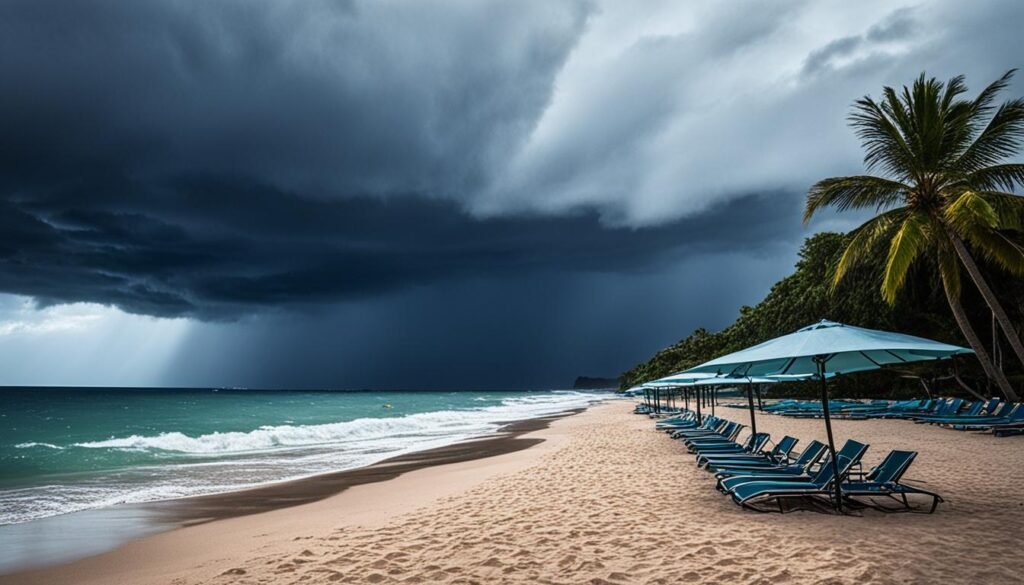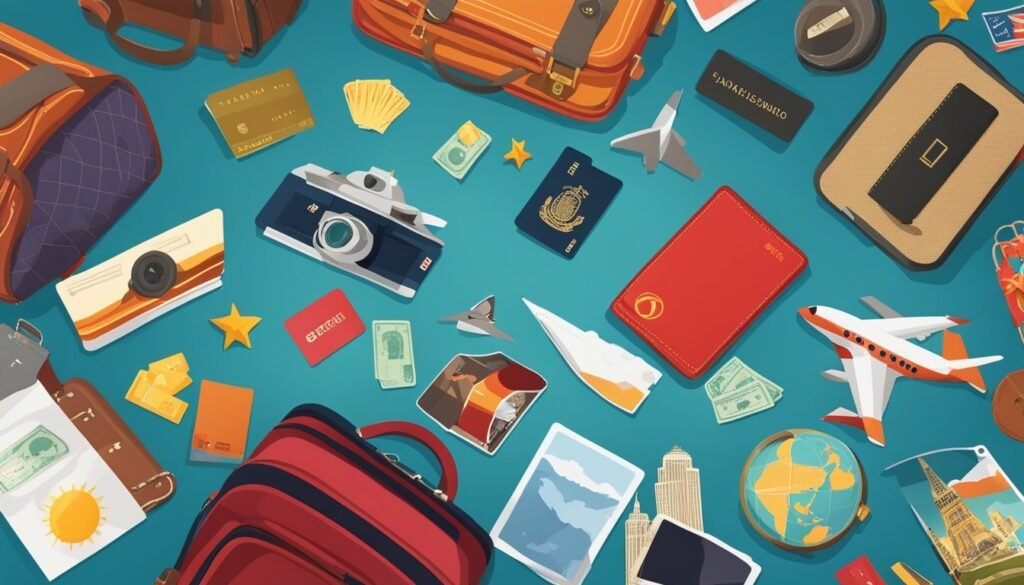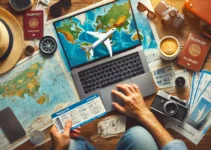Have you ever wondered how tourists stretch their dollars farther without sacrificing fun? I am thrilled to offer my travel advice now that I have figured out how to do it on a budget. You can have fantastic vacations without breaking the bank if you plan ahead and make cost-effective decisions.
Around a billion people traveled abroad in 2012, which is when I first learned about travel budgeting. I have since discovered a lot of strategies to cut costs without sacrificing experiences. By utilizing credit card perks and taking trips during off-seasons, my 10-point plan can help many travelers see more for less money.
In this brief read, let us examine travel that is both affordable and enjoyable. Both seasoned travelers and first-timers will find these tips very helpful. They will assist you in making the most of your trip funds and avoiding overspending in order to make priceless memories.
Key Takeaways
- Plan ahead to secure early booking discounts
- Travel during off-peak seasons for significant savings
- Maximize credit card rewards and travel points
- Explore alternative accommodation options
- Eat like a local to save on food expenses
- Seek out free and low-cost activities at your destination
Plan Ahead for Significant Savings
Budgeting for your vacation can be extended with careful planning. Planning ahead and completing your homework can result in significant savings. Let us examine some advice on how to cut costs while traveling.
Book Flights and Accommodations Early
You can save a tonne of money by making your basic travel arrangements in advance. When I travel domestically, I make an effort to reserve my accommodations and flights at least one month in advance. I plan trips overseas two to four months in advance. I frequently have more options and better prices as a result.
Research Local Eateries and Attractions
I always look up affordable places to eat and things to see before I go. This saves money and makes my trip better. Packing light lets me buy things at local markets, which adds to the experience.
Create a Detailed Budget Before Departure
It’s important to make a budget to avoid spending too much. I set limits for things like food, getting around, and fun activities. This keeps me on track and lets me enjoy my trip without worrying about money.
| Travel Expense | Average Daily Cost | Money-Saving Tip |
|---|---|---|
| Accommodation | $100 | Book early; consider hostels |
| Meals | $30 | Cook some meals and eat like locals |
| Transportation | $20 | Use public transit and walk when possible |
| Activities | $50 | Look for free or discounted attractions |
These planning suggestions have really reduced my expenses. For instance, saving up to $1000 annually can be achieved by packing lunches rather than going out to eat. It could cover the cost of a plane ticket. Recall that most travelers go over their budget, so having a solid plan is essential to staying within it.
Travel During Off-Peak Seasons

I’ve found that off-season travel is great for those watching their budget. By skipping the busy times, I’ve cut my travel costs and had unique experiences. Let’s look at the benefits of traveling during the shoulder season and finding low-season rates.
Did you know that you can save 25% to 50% on train tickets by booking your trip during the off-peak months? That is only the beginning. Prices for things to do and accommodations frequently decrease when the number of people is lower. For instance, in November, hotel rates in Florida can drop by as much as 50%.
I have located the following off-peak travel destinations:
- Iceland: October through December
- Europe: Winter for less-crowded museums
- Ireland: October through April for a cozy experience
- Galapagos Islands: January through March
- Sydney, Australia: July through September for lower airfares
In the Northern Hemisphere, the shoulder seasons typically run from April to May and September to October. There are less people around and pleasant weather during these times.
August is a fantastic month to travel to Kenya, Tanzania, and South Africa if you are a wildlife enthusiast. For safaris without the crowds, it is ideal.
Traveling off-season has benefits beyond financial savings. It’s about diving into real local experiences. In Bali, the rainy season brings cultural festivals. Finland’s fall is full of vibrant colors and free camping in national parks.
By choosing shoulder-season and off-peak travel, I’ve opened up a world of affordable adventures. It’s not just about saving money; it’s about enjoying places in their true form.
Maximize Credit Card Rewards and Travel Points
Using travel rewards smartly can really cut down on vacation costs. Credit card points and loyalty programs are full of value if you plan well. Let’s see how to use these perks to your advantage.
Utilize free-night certificates.
Every year, a lot of hotel credit cards offer certificates good for one free night. When the room rate exceeds the annual fee on the card, these come in quite handy. For instance, you can save a significant amount of money by using a certificate at the Westin New York Grand Central during busy times.
Book Hotel Rooms Using Points
Booking with points often helps skip resort fees and get discounts on longer stays. I once booked a stay for 480,000 Marriott Bonvoy points, which was worth 1.25 cents per point. That’s a big saving compared to paying with cash.
Take Advantage of Travel Card Perks
Travel cards give more than just points. I love the airport lounge access, which offers free food and a comfy spot during layovers. Some cards even have travel insurance, which saves me money on separate policies.

| Card/Program | Key Benefit | Potential Value |
|---|---|---|
| Chase Sapphire is preferred. | 60,000 bonus points | $750+ in travel |
| World of Hyatt Credit Card | Up to 60,000 bonus points | 5 nights at all-inclusive resorts |
| American Express Membership Rewards | 2 cents per point value | $2,000 on 100,000 points |
By making the most of these travel rewards, I’ve been able to enjoy luxury stays and flights at a much lower cost. It’s all about planning well and knowing the value of each point or mile in your loyalty program.
How to Save Money While Traveling
I’ve found some great travel hacks to save a lot on your next trip. These budget tricks let you stretch your money further and enjoy more of what’s in your destination.
Start by packing light to dodge extra bag fees. Always carry a reusable water bottle to avoid overpriced drinks. And when shopping for souvenirs, try haggling at local markets. It’s a smart way to save money on travel and improve your negotiation skills.
Choosing off-the-beaten-path spots often means finding cheaper options and real experiences. Being flexible with your travel dates can also lead to lower prices on quieter days. These tips can greatly reduce your travel budget.
“About 60% of Americans are planning to travel during the summer, with one in five intending to spend ‘significantly more’ compared to the previous year.”
To fight rising costs, try these money-saving tips:
- Use flight search aggregators like Google Flights for cheaper options
- Follow social media for flight deals at your preferred airports
- Look into Costco’s rental car services for member discounts
- Try Turo, a peer-to-peer car rental site, for good prices
- Build up points through credit card rewards to cut costs
Cooking meals where you stay can save a lot of money. Sonya Britt Lutter suggests booking a room with a kitchen is smart, especially with kids or if you snack a lot.
| Travel Hack | Potential Savings |
|---|---|
| Packing light | Up to $60 per round trip |
| Using a reusable water bottle | $2–$5 per day |
| Cooking meals | $20–$50 per day |
| Credit card rewards | Up to $750 in travel value |
By using these budget tricks and smart travel strategies, you’ll have a more affordable and fun trip. Enjoy your travels!
Explore Alternative Accommodation Options
Thinking outside the box for lodging can save a lot of money on trips. Let’s look at some budget-friendly options that can make your next trip cheaper and more fun.
Consider hostels or apartment rentals
Hostels and apartment rentals are great for those watching their wallets. I’ve found hostels that were half the price of hotels. They’re perfect for meeting other travelers and often have kitchens for cooking.
Try couchsurfing for a local experience
Couchsurfing is a great way to save money and dive into local culture. I’ve had amazing times staying with locals who showed me their city’s secrets. It’s free and lets you connect with people worldwide.
Look for hotels with budget-friendly amenities
When choosing hotels, I look for ones with features that save money. A kitchenette can cut food costs, and free breakfast can save up to $15 a day. These savings add up fast.

| Accommodation Type | Average Cost Savings | Key Benefits |
|---|---|---|
| Hostels | Up to 50% | Social atmosphere, communal facilities |
| Apartment Rentals | 30-40% | More space and kitchen access |
| Couchsurfing | 100% | Free, cultural immersion |
| Budget Hotels | 20-30% | Basic amenities, central locations |
By trying these alternative places to stay, I’ve been able to stretch my travel budget. Whether it’s staying in hostels, renting apartments, trying couchsurfing, or finding budget hotels, there are many ways to save. You don’t have to give up comfort or adventure to do it.
Smart Transportation Choices
I have discovered that choosing wisely when it comes to transportation can significantly reduce trip expenses. I always compare the costs of flying versus driving when making travel plans. Given the current state of gas prices, it is important to consider the vehicle’s fuel efficiency as well as the overall cost.

Public transit is usually the cheapest way to get around in many cities. I’ve seen that day or week-long passes for unlimited travel are really good deals. For example, in New York City, a 7-day unlimited MetroCard only costs $34. This lets me see the whole city without spending a lot.
When public transit isn’t an option, I look at ridesharing services. These can be a good choice instead of renting a car, especially for short trips. I always check online fare calculators to see which is cheaper before making a choice.
If I do need to drive, I work on making my car more fuel-efficient. This means taking out extra stuff and using apps to find the cheapest gas stations. On a recent trip, I saved almost $50 on gas by planning my stops to refuel better.
- Compare flying vs. driving costs
- Use public transit when possible
- Consider ridesharing for short trips
- Improve fuel efficiency when driving
By choosing smart transportation, I’ve been able to reduce my travel costs by up to 30% on some trips. It’s all about finding a balance between being convenient and saving money.
Eat Like a Local and Save
Embracing local cuisine is key to saving money while traveling. By shopping at local stores and eating at affordable places, I’ve found tasty meals without spending a lot.
Shop at Local Grocery Stores
Grocery shopping abroad is exciting. I enjoy looking for fresh produce and unique snacks at local markets. It helps me save money and experience the local food culture. Plus, I can buy essentials for my day trips.
Pack Snacks for Day Trips
Packing snacks from local stores has saved me a lot of money. I skip overpriced tourist spots and enjoy real treats on the go. It’s a smart way to save money and stay energized all day.
Seek Out Affordable Local Restaurants
Discovering hidden gems is the best part of eating out while traveling. I get tips from locals and look for busy eateries away from tourist areas. These places often have the best local food at good prices.
| Strategy | Savings Potential | Benefits |
|---|---|---|
| Local Grocery Shopping | 40-60% | Fresh ingredients and cultural experience |
| Packing Snacks | 30-50% | Convenience and budget control |
| Local Restaurants | 20-40% | Authentic flavors, supporting local businesses |
Using these strategies, I’ve cut my food costs in half on some trips. It’s not just about saving money. It’s about diving into the local food scene and making unforgettable memories.
Find Free and Low-Cost Activities
I always look for free attractions and budget-friendly activities when traveling. It’s amazing how much you can experience without spending a lot. Many cities offer free walking tours. These tours let you explore while learning about the local history and culture.
Museums often have free admission days or discounted hours. I check their schedules and plan my visits. Public parks, beaches, and nature trails are great for cost-free fun and relaxation.
Local experiences don’t have to be expensive. I enjoy attending free festivals, concerts, and cultural events. These save money and give you real insights into the place. City tours can be pricey, but you can find cheaper options or free tours led by locals.
| Activity | Average Cost | Budget Alternative |
|---|---|---|
| Museum Visit | $20 | Free on specific days |
| Guided City Tour | $50 | Free walking tour |
| Concert | $100 | Free outdoor performance |
| Theme Park | $80 | Public park or beach |
By choosing these budget-friendly options, I’ve learned to stretch my travel budget. It’s not just about saving money. It’s about diving into the destination and making unforgettable memories without the big costs.
Conclusion
I’ve shared many budget travel tips to help you plan affordable vacations. These tips can help you save money and enjoy unforgettable experiences. Booking flights and accommodations early and choosing off-season destinations can make a big difference.
Smart travel planning means looking for local eateries and using public transportation. Southeast Asia and Eastern Europe are great for budget-friendly travel. Remember, packing light saves on baggage fees and keeps you flexible.
Your food expenses can be decreased by selecting restaurants that offer free breakfast or kitchenettes. One of the best ways to eat cheaply is to check out local markets and street food. You can turn your ideal vacation into a reality without going over budget if you plan carefully and use some imagination.
FAQ
How can I save money on flights and accommodations?
Book your flights and accommodations early, at least a month ahead for domestic trips and 2-4 months for international ones. This helps you get better rates. Travel during off-peak seasons to find lower prices.
How can credit card rewards and travel points help me save on travel?
Hotel credit cards often offer free-night certificates. These can be great if the room costs more than the card’s annual fee. Use points to book hotel rooms and skip resort fees. You might also get discounts for longer stays.
Don’t forget to use travel card perks like airport lounge access.
What are some strategies to save money while on the trip?
Pack light to dodge checked bag fees. Carry a reusable water bottle and haggle at local markets. Stay off the tourist path and be flexible with your travel dates to find cheaper options.
What are some alternative accommodation options to save money?
Try hostels, apartment rentals, or couchsurfing for cheaper stays. When picking hotels, look for ones with kitchenettes or free breakfast. This can help cut down on your trip costs.
How can I save money on transportation during my trip?
Compare flying versus driving costs. Use public transport or bike rentals when you can. Remove extra cargo to improve fuel efficiency, and use apps to find cheap gas stations.
Consider ridesharing over car rentals for another way to save.
What are some tips for eating on a budget while traveling?
For meals and snacks, visit your neighborhood grocery stores. When going on flights or day trips, pack your own food. Instead of eating at popular tourist destinations, look for reasonably priced local restaurants.
Pick lodgings that offer kitchenettes if you want to prepare some meals on your own.
How can I find free or low-cost activities during my trip?
Many cities offer free walking tours, museum days, and public attractions. Use student, senior, or AAA memberships for discounts. Enjoy nature trails, public parks, and beaches for free fun.
Check local event calendars for free festivals, concerts, or cultural events.


